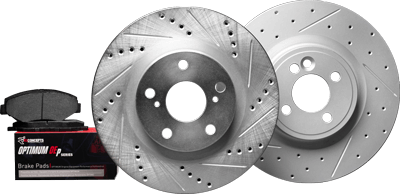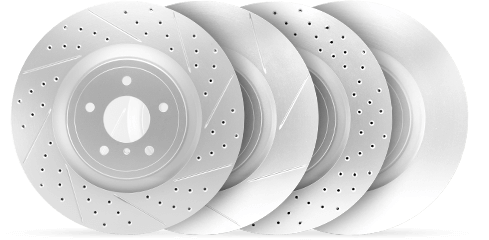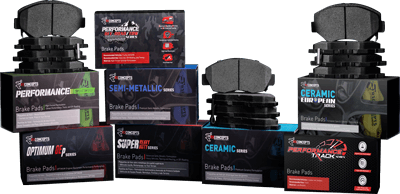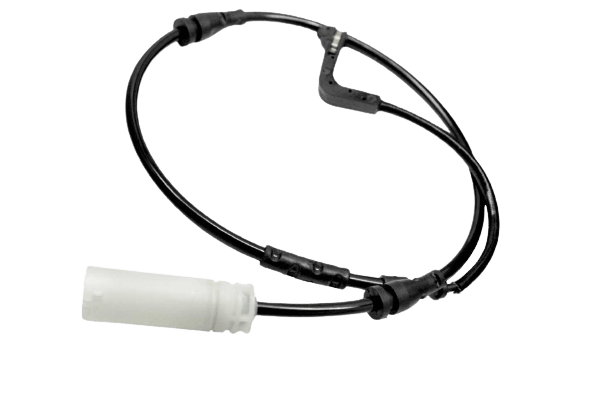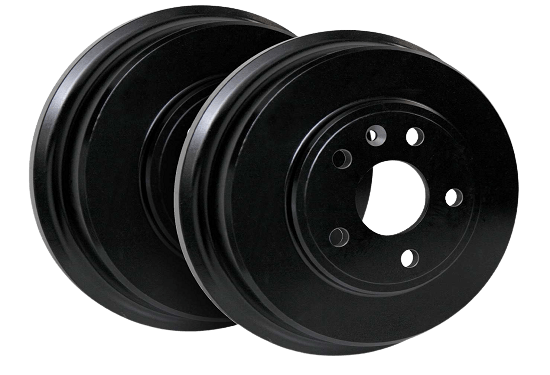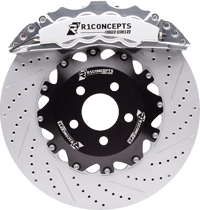If you’re wondering why your brakes are squeaking, you’re not alone. Squeaky brakes can be alarming and frustrating, but they can often be fixed with a bit of know-how. This article cuts to the chase, explaining the primary reasons brakes squeak and offering effective solutions to ensure your safety and comfort on the road.
The following tips are exclusively and professionally written by R1 concepts; the experts when it comes to brakes because we make the best OEM brake parts in the market!
Key Takeaways
Worn or improperly installed brake pads, accumulation of dust and debris, and corrosion on rotors are common causes of squeaky brakes.
Understanding the mechanics of the braking system, such as the role of brake calipers and slide pins, is crucial for diagnosing and fixing squeaks.
Regular maintenance and proper lubrication of brake components are key preventive measures to avoid squeaky brakes, along with using the right brake pad material for your vehicle.
Why Are My Brakes Squeaking Or Squealing?
the reason behind your brake pads squeaking or squealing is because your brakes are compromised. Typically, it can be that your brakes are worn, glazed or just plain dirty. Each of the issues requires different solutions in order to fix them.
Identifying the Culprits Behind Squeaky Brakes
Brake squeaks can be likened to a warning sign, wear on brake pads due to usage as well as dust and debris buildup are some of the likely culprits behind brake squeals, which you shouldn’t take for granted!
A problem with your brake system can be a cause of a serious inconvenience or worse, so here’s the common cause of squeaky brakes.
Worn Brake Pads
Yes, one of the common reasons your brakes squeak is because of worn brake pads.
The metal indicators embedded in the brake pads start to make a squeaking sound when they have been worn down from consistent use, warning you that your brakes need attention and may soon reach the end of their useful life. This noise comes as friction occurs between these components and rotors inside your braking system – the unsung heroes that take on much of this wear and tear!
Glazed Brake Pads
Glazing of the brakes is caused by too much heat and pressure which makes them harden resulting in squeaking when braking. This glazed state also reduces their efficiency at producing friction needed for effective breaking performance, like stopping a car wearing skates! Essentially this excessive warmth combined with tremendous force leads to diminished grip while driving as well as generating noises from worn out parts.
So, if your brake pads look shiny and smooth, that’s not a good sign, better to change your brakes now if this is the case. We recommend to change it with brake pads that are long lasting and reliable that are also free of harmful substances like asbestos.
Loose or Worn Brake Hardware
When brake hardware, such as clips, springs, or pads, becomes loose or worn, it can cause metal-to-metal contact or vibrations during braking. This friction and movement result in a squeaky noise as the components interact unevenly, creating audible friction that is transmitted through the brake system.
Accumulation of Brake Dust and Debris
Accumulation of brake dust and other debris, on brake components can create friction and vibrations during braking, leading to a squeaky noise. The dust and debris interfere with smooth brake operation and generate noise as the brakes are applied.
Rust and Corrosion on Brake Rotors

Rust is a major cause of damage to car brake rotors. When they are rusted, the contact with the pads becomes uneven, leading to screeching sounds from your brakes and weakening them further. Extended exposure to moisture can worsen these symptoms significantly.
Aside from the mentioned ones, rusty rotors reduce how effective your brake pads work as well, the best to do is to resurface or better yet replace it with brakes that do not rust such as carbon coated brake rotors.
Incorrectly Installed Brake Pads
Incorrectly installed brake pads may not sit properly or make uneven contact with the brake rotor. This can lead to friction, vibrations, and squeaky noises when the brakes are applied due to the misalignment or instability of the brake pads during operation.
Environmental Factors
Sometimes, fluctuations in temperature and moisture may have brake failure and result in momentary squeaking noises coming from your brakes. It is similar when a car has difficulty starting in cold weather. There are some instances where the conditions just don’t make it possible for these parts to function properly.
The Mechanics of Squeaking: Understanding Your Braking System
By knowing the interactions of all components within a braking system, it can help in more rapidly isolating squeaking issues. Just like understanding how an alarm clock works makes resolving any problems easier, becoming familiar with your brake system aids in fixing noisy brakes that have arisen from common sources.
The Role of the Brake Caliper
The brake caliper is integral to your braking system, as it supplies the pressure which allows the pads to rub against the rotors in your wheels in order to create enough friction needed for stopping your vehicle.
If something goes wrong with this part of a car’s brakes then you might experience squeaking or vibrating coming from them, an indication that Maintenance may be necessary.
Slide Pins and Their Importance
Slide pins are an indispensable part of the braking system in cars – they ensure that a brake caliper is correctly aligned with its rotor, so as to enable the pads to touch at an ideal angle.
If these slide pins become mucky or rusty it could result in the caliper either seizing up or performing unevenly. Causing squeaking and other noises when brakes are applied.
Pressure and Heat: Factors That Influence Brake Squeak
The greater amount of friction and temperature created by excessive force on the brakes often causes deterioration in their condition which creates that telltale noise.
It can be easy to overlook the heat and pressure our brakes take on every time we use them, but understanding these factors is essential for preventing squeaky brake pads. To minimize this possibility, you should keep an eye out for any signs of wear-and-tear or other issues with your braking system. Being mindful about how much pressure you are applying when using your car’s breaks could make big difference and all the difference in avoiding a screeching sound whenever they’re employed!
Is My Squeaking Brakes Dangerous?
Squeaking brakes themselves are not necessarily dangerous, but they often indicate an issue that should be addressed.
If you’re hearing a squeaking sound from your brakes, it’s important to determine whether the squeal noise is merely an annoyance or needs attention. It could be that the squealing just causes frustration, like a new installed brake rotor, but then again, there might also be something more pressing going on under the surface with your brake system.
Can I Fix My Squeaky Brakes Myself?
Yes, you may be able to fix squeaky brakes yourself depending on the cause. However, it’s important to note that handling brake maintenance requires specific knowledge and experience, so the best option would be to seek help from a professional car mechanic for the said issue.
Self Diagnosing Squeaky Brakes
Identifying the root cause of your brake noise problem can be essential for a prompt and effective resolution. Understanding the potential sources of the noise can help you fix your squeaky brake problems or typically, communicate effectively with a professional mechanic when needed.
The Type Of Noise
A loud squealing sound or squeaky sound may point towards worn brake pads, whereas grinding indicates that they are down until metal level with no more rubber present for protection against harsh surfaces.
The type and nature of the noise we hear can give us a helpful hint as to what might be wrong. Thus, understanding these kinds of noises can help you in tackling your problem quickly and accurately!
Check Brake Caliper and Brake Pads
Examine the brake calipers to ensure they are functioning properly and securely mounted. Loose or malfunctioning calipers can lead to uneven brake pad wear and contribute to squeaking. Look for any fluid coming from the caliper as well.
Inspect the brake pads for signs of wear, and check if they are evenly contacting the brake rotor. Uneven pad wear or improper alignment can result in noise during braking. Additionally, assess the condition of the brake pad material; worn or glazed pads may produce squeaks.
Check for Debris
If there are no problems with the calipers and pads, next thing to do is to look for any foreign objects stuck in the brake system that could be causing unwanted friction and resulting in your car’s brakes’ squeaking. This could range from small pebbles to dust accumulation on the brakes. It’s important to remember that even the smallest particle can produce a bothersome noise. So, ensure to check all parts meticulously and clean any debris you find.
Inspect The Rotor
Check your brake rotor and see if it’s still in good shape literally. A deformed rotor can be an indicator of the potential cause of squeaky brakes. If you detect any deformities or irregular wear on them such as gouges and distortion, it might be advisable to have your rotors resurfaced or replaced.
Check for Fluid Leaks
For your braking system to function optimally, inspect for any fluid leakage. Damp spots or a lower-than-normal brake reservoir are indications that there may be an issue with the brakes and could result in failure if not taken care of immediately due to decreased pressure.
Check For Incorrect Installation
When checking for uneven installation in your brake system, inspect the brake components for alignment and symmetry.
Ensure that brake pads are evenly seated on both sides of the brake rotor without any visible misalignment. Look for consistent spacing between the brake pads and the rotor throughout the rotation.
Check for proper installation of brake hardware, such as clips and springs, making sure they are securely in place. Uneven installation can lead to imbalances and cause squeaky brake noises.
Preventive Measures and Maintenance Tips
It is best to take preventive measures rather than try and fix squeaking brakes. Getting regular maintenance done on your brake system can help you avoid loud noises from the brakes when in use. Here are some key steps which will keep them running smoothly.
Brake inspections should be carried out frequently so that any potential issues get addressed before becoming bigger problems.
Ensuring proper lubrication of all parts will also reduce the chances of hearing squeaking coming from your vehicle’s braking system. This means checking for worn or corroded components too, as they are worn or corroded.
Regular Inspection of Brake Pads and Rotors
Just like making sure your car’s oil and tire pressure are on point, it is essential to inspect the brake pads and rotors routinely. Keeping an eye out for any indications of trouble will ensure that your brakes stay in top condition at all times. Checkups need to be done regularly with special attention paid to both pads and rotors since they play a key role in keeping braking power up to par!
The Right Lubrication at Contact Points
Lubrication is a critical preventive step that must be taken. Pins and other components of the brakes should all have adequate lubricant, so they will not seize, rust or create any squeaks. Remember – when these parts are well-lubricated, it can only improve their performance!
Keeping contact points greased up guarantees better functioning for your machine as a whole.
Choosing the Best Brake Pad Material for Your Vehicle
When it comes to brake pads, the material used can play a major role in performance. Depending on your vehicle and driving style, selecting the best pad for you is essential so that squeaks are avoided.
The appropriate choice of materials may provide more efficient braking results as well as a guaranteed peac of mind whenever you’re behind the wheel. Taking these considerations into account will ensure that each time you hit those brakes they respond correctly with no fuss or noise associated!
Solutions to Silence Squealing Brakes
At times, brakes may become so noisy that preventive measures are no longer effective in getting rid of the squeaks. In such cases, a few helpful strategies to banish those pesky sounds can be found here. By using these methods, you should be able to significantly reduce or eliminate your brake’s annoying squeals once and for all!
Resurfacing or replacing damaged brake rotors
Resurfacing or exchanging your brake rotors could be the solution needed if they appear to have been damaged or worn out after doing a self diagnose. Making sure that your brake pads come in contact with an even, flat surface will reduce any chances of hearing squeaky noises coming from them.
Cleaning and lubricating brake components
It is possible to lessen the annoying sound of brake squeaking in cars with just a straightforward clean. By clearing away dirt and grease, while adding in adequate lubrication, it can help reduce friction that creates this loud brake squeak.
Adjusting or replacing loose hardware
The hardware related to your brakes may need adjustments or replacements if you notice the brake system is making vibrations and squeaks. By taking care of these components, it can ensure that braking occurs smoothly and without producing any noise.
Summary
Ultimately, the squeaking from your brakes is an indicator that there are underlying issues with the braking system. Whether it’s worn brake pads, loose hardware or a buildup of dust on them, understanding why they’re making noise will help you find a solution to fix it. DIY solutions can address some minor problems, but don’t be afraid to seek professional assistance as these components affect your safety and should not be taken lightly.
Frequently Asked Questions
How much does it cost to fix squeaky brakes?
The cost to fix squeaky brakes can vary. DIY solutions are usually cost-effective, while professional services can range from $100 to $300 or more, depending on the severity of the issue and labor rates. This range accounts for a thorough system inspection, part repairs, part replacements, and mechanic’s fees. The exact cost is dependent on your vehicle’s specifics and the mechanic’s pricing.
Is it OK to drive with squeaky brakes?
It’s not a good idea to drive if your brakes are making any sort of squeaking or grinding noise. This could signal an underlying issue that requires immediate attention in order to avoid potential, expensive damage, so it is highly recommended you have the brakes checked right away.
Why do my brakes squeak but pads are good?
Brake squeaking could be caused by a range of issues, such as not having enough lubrication on the brake components, dirt or debris between the rotors and pads that were fitted incorrectly. Sometimes there may just be moisture present from overnight which can cause a minor morning squeak when braking.
Can I spray WD40 on my brakes to stop squeaking?
Using WD-40 on brakes is not advised for your squeaking brakes as it can harm the system and compromise safety. Brake parts need specific lubrication that WD-40 doesn’t offer. Squeaks often need the proper brake lube and the proper application of lubricant in order to fix it.
Can squeaky brakes be dangerous?
Yes, squeaky brakes can be dangerous as they may indicate serious issues like worn-out brake pads which can lead to potential damage to your braking system if not addressed promptly.
How to Stop New Brakes from Squeaking?
To prevent new brakes from squeaking, ensure they are correctly installed and that all components, including calipers, pads, and rotors, are properly aligned and lubricated. Break in the brakes gently by avoiding harsh braking for the first few hundred miles. Clean any manufacturing residue from the rotors and check for any protective coatings on the pads that need to be removed before use. If squeaking persists, consult with a professional mechanic to diagnose and resolve the issue.
Why My Ceramic Brakes Squeak?
Ceramic brakes are praised for their long-lasting quality and strong performance. However, they can sometimes make a squeaking sound. This squeak happens when the hard ceramic material of the brake pads vibrates against the brake rotor, especially during gentle stops or in cooler weather when the pads are stiffer.
It’s also common for brand-new ceramic brake pads to squeak at first. As you use them, they’ll wear in a bit and fit better against the rotors, which should help quiet down the noise.


